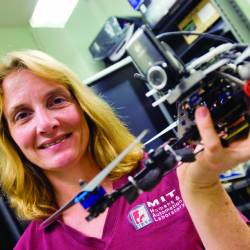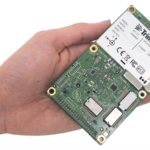
1. The Team
Airspace Integration Research (NUAIR) Alliance leads a consortium of more than 50 universities, companies and facilities supporting testing on unmanned aircraft systems (UAS) in New York and Massachusetts. The group includes firms like Lockheed Martin, Raytheon and Helios as well as research organizations such as Draper Laboratory and the Air Force Research Labs Information Directorate. More than 20 colleges and universities contribute to NUAIR.
1. The Team
Airspace Integration Research (NUAIR) Alliance leads a consortium of more than 50 universities, companies and facilities supporting testing on unmanned aircraft systems (UAS) in New York and Massachusetts. The group includes firms like Lockheed Martin, Raytheon and Helios as well as research organizations such as Draper Laboratory and the Air Force Research Labs Information Directorate. More than 20 colleges and universities contribute to NUAIR.
2. Test Ranges Include
Griffiss International Airport in New York state and Joint Base Cape Cod in Massachusetts plus other locations on a case-by-case basis.
3. Research Centers
The Rochester Institute of Technology and the Massachusetts Institute of Technology lead a network of research institutions that includes Boston University, Cornell University, Cape Cod Community College, Cayuga Community College, Clarkson University, Dowling College, Embry-Riddle Aeronautical University, Georgia Tech Research Institute, Mohawk Valley Community College, Onondaga Community College, Rensselaer Polytechnic Institute, Syracuse University, the University of Massachusetts at Lowell, and Worcester Polytechnic Institute plus SUNY IT, the SUNY Binghamton, Morrisville, Buffalo, Oswego and Cortland campuses and the SUNY College of Environmental Science & Forestry.
4. Incentives
New York has more than 80 technology incubators and co-location facilities spread throughout the state. There is also a program in place where businesses that locate within certain distances of academic institutions can receive an income tax exemption, said Lawrence H. Brinker, NUAIR executive director and general counsel. Massachusetts, which is famous for its tech companies, has a fund geared specifically to helping such firms get off the ground. The Emerging Technology Fund offers qualifying companies loans or loan participations of up to $1.5 million and loan guarantees of up to $1.5 million. Bridge financing is available to support firms until federal grants arrive and certain Massachusetts counties and regions have additional loan programs.
5. Contact
Lawrence H. Brinker, Esq.
Executive Director and General Counsel
Office: 607-206-2167
email: lbrinker@nuair.org
Andrea Bianchi
Program Manager
Office: 315-470-1835
email: lbrinker@nuair.org
NUAIR Alliance
115 West Fayette Street
Syracuse, New York 13202
Web: www.nuair.org
The states of New York and Massachusetts are collaborating to support research on unmanned aircraft systems (UASs) through the non-profit Northeast UAS Airspace Integration Research (NUAIR) Alliance. Working under Federal Aviation Administration (FAA) oversight, NUAIR will help develop processes for UAS testing, evaluation, verification and validation. The Syracuse-based group will also support work on sense-and-avoid technologies and techniques for integrating unmanned aircraft into the congested Northeast airspace.
Though testing can potentially take place anywhere in the region with FAA approval the two main ranges are located at Griffiss International Airport in Rome, New York and Joint Base Cape Cod in Massachusetts about 55 miles south of Boston. Griffiss has space to host visiting researchers, said Larry Brinker, NUAIR’s executive director and general counsel. The facility can provide up to two private offices, hangar space, storage space and analysis capability. There are two other New York airports supporting NUAIR as well: the Plattsburgh International Airport in Plattsburgh and Binghamton International Airport in Binghamton.
NUAIR’s academic contingent includes more than 20 colleges and universities from around the region. They are led by the Rochester Institute of Technology (RIT) in Rochester, New York, and the Massachusetts Institute of Technology (MIT) in Cambridge, Massachusetts RIT researchers have worked on a range of UAS technologies including autonomous navigation and image processing and techniques for improving battlefield drones. They also have “developed some very spectacular imaging sensors,” said Brinker.
The research at MIT includes work on new materials, control interfaces and even the development of small quad-copters to act as guides on the MIT campus. MIT scientists will test their designs on the 22,000 acres of Joint Base Cape Cod, which stretches to parts of Bourne, Falmouth, Mashpee and Sandwich. MassDevelopment, the state’s finance and development authority, will manage the facility, which was formerly known as the Massachusetts Military Reservation.





